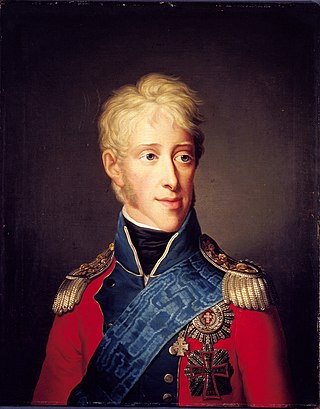
Frederick VI was King of Denmark from 13 March 1808 to 3 December 1839 and King of Norway from 13 March 1808 to 7 February 1814, making him the last king of Denmark–Norway. From 1784 until his accession, he served as regent during his father's mental illness and was referred to as the "Crown Prince Regent". For his motto he chose God and the just cause and since the time of his reign, succeeding Danish monarchs have also chosen mottos in the Danish language rather than the formerly customary Latin. As Frederick VI had no surviving sons to succeed him, he was succeeded on the throne of Denmark by his half-first cousin Christian, who was his father's half-brother's son.

Princess Louise of Denmark and Norway was born to Frederick V of Denmark and Louise of Great Britain. Her eldest daughter, Marie of Hesse-Kassel, was the wife of Frederick VI of Denmark.
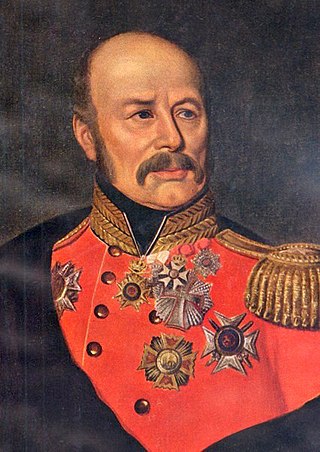
Peter Carl Frederik von Scholten was Governor-General of the Danish West Indies from 1827 to 1848.

Princess Louise Charlotte of Denmark was a Danish princess, and a princess of Hesse-Kassel by marriage to Prince William of Hesse-Kassel.

Peter Christian Kierkegaard, was a Danish theologian, politician and Bishop of Diocese of Aalborg from 1857 until 1875.
Events from the year 1903 in Denmark.
Events from the year 1849 in Denmark.
Events from the year 1784 in Denmark.
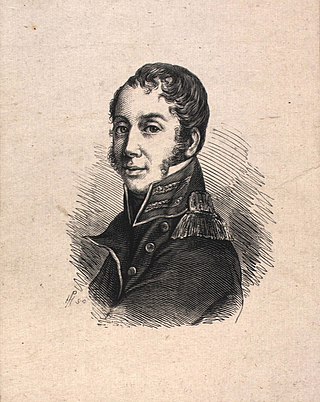
Hans Peter Holm was a Danish naval officer who commanded vessels of the Dano-Norwegian Navy in several actions. He commanded several naval vessels during the Gunboat War. His most important action occurred in 1812 at the Battle of Lyngør when a British squadron, led by the British ship-of-the-line HMS Dictator, destroyed his vessel, HDMS Najaden. Holm sustained wounds in the battle but survived, only to drown in an accident shortly afterwards.
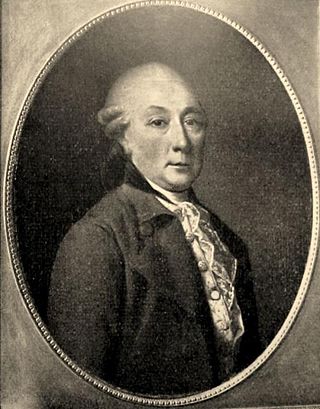
Poul Abraham Lehn, Baron of Lehn and Baron of Guldborgland, was a feudal baron of the Danish and Norwegian nobility and one of the greatest landowners of his time in Denmark.

The De Coninck House is a historic property located at Store Kongensgade 72 in central Copenhagen, Denmark. It takes its name after Frédéric de Coninck for whom it was built in the 1790s.

Martin Johannes Hammerich was a Danish art historian, educator, author and translator. He was part of the National Liberal movement and a member of the 1848 Danish Constituent Assembly. He was headmaster of Borgerdydskolerne from 1842 to 1867.
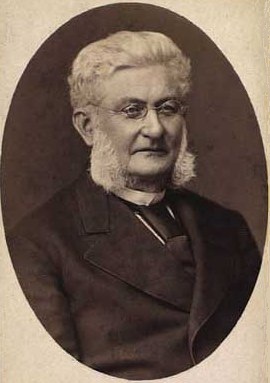
Johannes Peter Langgaard was a Danish mechanician and brickyard owner. He established Hakkemose Brickworks at Taastrup in 1847.

Jacob Christian Bendz was a Danish medical doctor, military surgeon and titular professor. He was created a Knight in the Order of the Dannebrog in 1846 and was awarded the Order of Merit in 1849. He was a brother of the painter Wilhelm Bendz and a son-in-law of the wealthy wine merchant Christian Waagepetersen. He also wrote "the first real Tarok book" on the game of Danish Tarok.

Sophie Wilhelmine Bertha Ørsted was a Danish socialite and muse. Brought up in a literary environment in Copenhagen, she was the sister of writer Adam Oehlenschläger (1779–1850) and was married to jurist Anders Sandøe Ørsted (1778-1860). She became an inspiration for others, including the poet Jens Baggesen (1764–1826). She died of abdominal complications when she was only 35.

Sabinus Theodor William Halvor Seidelin was a Danish businessman and landowner. He founded the company S. Seidelin.

Poul de Løvenørn (1751–1826) was a Danish naval officer and cartographer, scientist, administrator and diplomat.

Edouard Suenson was a Danish vice admiral who was known for his participation in the First Schleswig War and Second Schleswig War where he was the main Danish commander at the Battle of Heligoland.
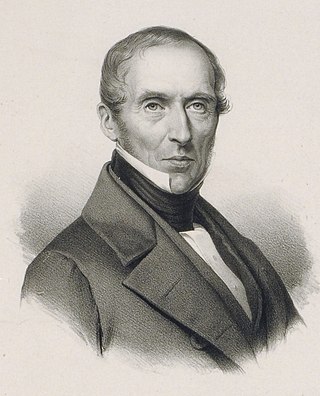
George Ryan was an Irish-born Danish merchant, ship owner, banker and planter. He continued running a trading house and shipping firm founded by his brother Phillip Ryan. He owned the property at Sankt Annæ Plads 7 in Copenhagen and the sugar plantation Mary's Fancy on Saint Croix in the Danish West Indies.

Georg Emil Tuxen was a Danish naval officer.

















